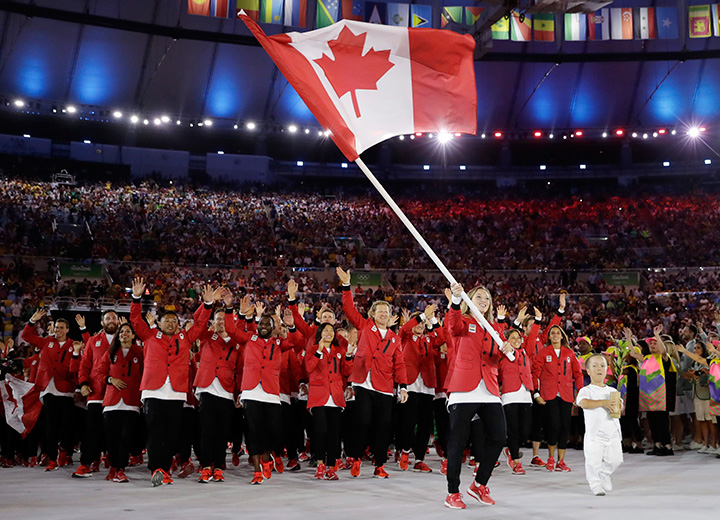The heat is on and the world is watching as Canada’s athletes compete at the Rio Summer Olympic Games.

Along with technique and skill, by the time athletes make it to the Olympics they’ve spent years training their bodies and minds to prepare for the stress and pressure of competition.
FULL COVERAGE: Rio 2016 Olympics
Canada’s Rio flag bearer Rosie MacLennan, who won gold in trampoline in 2012, said she’s been mentally preparing for Rio since the last Games.
“I think there’s some pressure and a little extra attention, but my coach and I sat down right after London and we talked about it, and we didn’t want to go into Rio as a defending champion,” MacLennan told Global News this spring.
“Because if you think that way, it’s almost as if you have something to lose, and I really don’t feel as if I have anything to lose.”
It’s about looking forward, not back, for the 27 year old.

“I’m really just focused on my routines … I’m really focused on what it’s going to take to be my best on that day on August 12.”
While athletes are used to competing, the Olympic games are unlike any other, and with that brings unique pressures.
RIO 2016: Team Canada receives warm welcome at opening ceremony of Rio Games
“The Olympics is very important for all these athletes and for many of them it’s the event of their lifetime in terms of athletic performance,” said Peter Crocker, professor of sport and exercise psychology at UBC’s school of kinesiology.
“They know what state they need to be in to put out their best performance.”
Psychological preparation is a key component of an athlete’s training. Breathing exercises, meditation, self-talk and visualization are some of the techniques athletes use to focus.
Some even go through a mental routine before competition to focus and get into the internal state they need to be in to perform.
“So a lot of things that you won’t be able to tell by looking at the athletes, because a lot of these are going on inside their head in terms of their preparation,” said Crocker. “A lot of techniques are really designed to get themselves into that right, intentional, focused stage they need to be in.”
Staying focused on the game
Think about the last time you travelled to an exotic, bustling city. Then imagine you were doing so to compete at the Olympics.
Women’s rugby team coach John Tait admitted before the Games that focus would be the team’s biggest challenge in Rio.
“We’ve got some support staff with Olympic experience and I keep hearing about the distractions of the Olympics, the stage of the Olympics and how it can distract and unfocus a group,” said Tait.
RIO 2016: 11 interesting facts about the modern Olympic Games
“So our challenge will just be about focusing on things we can control, you know, treating it as much a normal competition and staying in our routines and keeping the same focus we try and go into every series event.”
Perhaps added to the pressure, women’s rugby made its Olympic debut in Rio.
“There’s a lot of distractions,” said team captain Jen Kish. “I think to handle distractions you’ve got to make your world as small as possible.”
Side note: The team went on to win bronze in women’s rugby sevens.

The Games can also bring new competitors.
“It’s a lot different because, you know, it’s everybody in the world now. Everybody stepped up their game,” said sprinter Andre De Grasse to Global News ahead of the Olympics.
“It comes around every four years, so everyone’s going to be on top of their game.”
Crocker says for many the Olympics are the “event of their lifetime in terms of athletic performance.”
RIO 2016: Team Canada trading cards. Collect them all!
“It can be, for a lot of them, probably the biggest pressure they’ll face. But it also depends and their skills and their own experience.”

Preparing for the games can be all-consuming.
“I eat, sleep, breathe Rio. Like, everything is about Rio,” pole vaulter Khamica Bingham told Global News this spring.
“Honestly, to get on the podium would mean the world to me. I would drop down and just be so happy, thankful. I dream about that every day, so you know, it’s what I’m working towards.”
Pressure to repeat
Defending world champion high jumper Derek Drouin, who won bronze in London, said you can’t go into competition feeling marked as the one to beat, or as if you have a target on your back.
“You know, I don’t get extra points or extra bars because I won the world championship the year before,” said Drouin.
“Everybody’s on the same playing field and it just, you know, it’s going to come down to who’s the best competitor on that day and I…when those are the factors I like my chances.”

And sorry to break it to the loyal fans back in Canada, but athletes likely don’t have you on their mind as they compete.
“To a large extent the athletes kind of ignore a lot of that because they’re so into their training cycles and preparations cycles,” said Crocker.
“As supporters we maybe pay more attention but these athletes have been training for a long time so, yes, they would like to do well but that’s not where their primary focus. Their focus is what they need to do in their events or their game.”





Comments